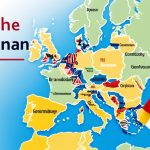Ready to turn your love for travel into a thriving business in Portugal? Explore our guide to kickstart your travel business in Portugal today.

Portugal, with its stunning landscapes, rich history, and vibrant culture, has become a popular destination for travelers from around the world. Portugal has a fascinating history that intrigues visitors, from its status as one of the oldest countries in the world (founded in 1139) to its legendary navigators like Vasco da Gama and Ferdinand Magellan who set out on ground-breaking journeys from Portuguese shores. Portugal is also home to the world’s oldest bookstore, Bertrand Bookstore, which has been open since 1732, and boasts some of the most stunning beaches in Europe
If you have a passion for travel and a desire to share the beauty and charm of Portugal with others, starting a travel business in this picturesque country can be a fulfilling and profitable venture. In this guide, we will walk you through the essential steps and provide you with top tips to kickstart your travel business in Portugal.
Research and Planning
Starting a travel business in Portugal, like any other venture, requires thorough research and meticulous planning. Let’s take a look at some initial steps to take:
Identify Your Niche: Decide on the type of travel business you want to start. Will it be a tour agency, a travel blog, a vacation rental service, or something else? Identify your niche to stand out in the competitive travel industry.
Market Research: Research your target audience and competition. Understand what travelers are looking for when visiting Portugal and how you can meet their needs and preferences.
Legal Requirements: Familiarize yourself with the legal requirements for starting a business in Portugal. This may include registering your company, obtaining permits, and complying with tax regulations.
Business Plan: Create a comprehensive business plan that outlines your goals, strategies, budget, and revenue projections. A well-thought-out plan will be your roadmap to success.
Register Your Business
Once you’ve decided on the type of travel business you want to establish, it’s time to register your company. In Portugal, you can choose between different legal structures, such as sole proprietorship, limited liability company (LDA), or others. Consult with a legal expert or accountant to determine the most suitable option for your business.
Obtain Necessary Licenses and Permits
Depending on the nature of your travel business, you may need specific licenses and permits to operate legally. For example, if you plan to offer guided tours, you might need a tourism license. Research the requirements and ensure you obtain all the necessary permits to avoid legal issues down the road.
Build Your Online Presence
In today’s digital age, having a strong online presence is crucial for any travel business. Consider these steps to establish your online presence:
Create a Website: Invest in a professional website that showcases your services, destinations, and contact information. Ensure that it is mobile-responsive and user-friendly.
Social Media: Utilize social media platforms like Instagram, Facebook, and Twitter to promote your travel business. Share captivating images and engaging content to attract potential customers.
Content Marketing: Start a travel blog on your website to share informative and inspiring articles about Portugal. This can help you establish yourself as an expert in the field while improving your website’s search engine ranking.
Partner with Local Suppliers
To offer exceptional travel experiences, collaborate with local suppliers such as hotels, restaurants, transportation providers, and tour guides. Building strong partnerships will not only enhance your offerings but also help you negotiate better deals for your customers.
Develop Unique Travel Packages
Distinguish your travel business by creating unique and appealing travel packages. Consider the diverse interests and preferences of travelers, from historical tours to culinary adventures and outdoor activities. Offering a variety of packages can attract a wider audience.
Provide Exceptional Customer Service
Outstanding customer service can set your travel business apart from the competition. Be responsive to inquiries, address customer concerns promptly, and go the extra mile to ensure your clients have a memorable experience in Portugal.

Marketing and Promotion
Promoting your travel business is essential for attracting customers. Here are some effective marketing strategies:
- Search engine optimization (SEO): To increase your website’s visibility in search results, optimize it for search engines. Use appropriate keywords that are related to Portugal’s travel industry.
- Email Marketing: Build an email list of interested travelers and send them regular updates, special offers, and travel tips.
- Online Advertising: To reach potential customers, look into running online ads on platforms like Google Ads or Facebook Ads.
- Collaborate with Influencers: Partner with travel influencers who can promote your services to their followers.
Safety and Compliance
In the realm of travel, the safety and compliance of your operations are non-negotiable. Whether you’re managing a tour agency or accommodations, ensuring your travelers’ well-being should always be a top priority. To successfully handle this essential aspect:
Stay Informed:
To safeguard your travelers, it’s crucial to stay updated on relevant health and safety regulations. These rules can evolve, so it’s important to regularly monitor official government updates and travel advisories. This ensures that you’re always aware of any changes that might impact your business.
Prepare for Emergency:
Prepare for the unexpected by providing travelers with a list of essential emergency contacts. Include local authorities, medical facilities, and your business’s contact information. This empowers travelers to take swift action if they encounter any issues during their journey.
Get Insurance Coverage:
Encourage travelers to consider investing in comprehensive travel insurance. This safety net can protect them in case of unforeseen events, such as trip cancellations, medical emergencies, or travel disruptions. Having insurance provides peace of mind for both you and your customers.
Setting safety and compliance as a top priority not only satisfies modern passengers’ expectations but also helps your travel company build reputation and trust. It’s an investment that guarantees your clients a stress-free and enjoyable stay in Portugal.
Securing Funding
Establishing and expanding your travel business in Portugal can be an exciting venture, but it often requires financial resources to bring your dreams to life. If you find yourself in need of additional funding, there are several financing options to consider.
Personal Savings:
One of the most straightforward ways to finance your travel business is by using your personal savings. This approach allows you to retain full ownership and control of your business while avoiding the complexities of borrowing money. However, it’s essential to first assess your financial situation and determine how much of your savings you can comfortably allocate to your business.
Loans:
Traditional bank loans are a popular source of capital for business owners. These loans often have set interest rates and terms for repayment. Be prepared to provide a detailed business plan, financial statements, and collateral, as banks assess the risk associated with lending.
Alternatively, online lending platforms have gained popularity in recent years. They offer a quicker application process and may be more accessible for businesses with limited credit history. However, interest rates may be higher than traditional bank loans.
Grants:
Find out if there are any government grants or subsidies available to support the growth of travel businesses in Portugal. These grants often come with specific eligibility criteria and application requirements, but they can provide a valuable injection of capital without the burden of repayment.
Angel Investors:
Angel investors are individuals who provide capital to businesses in exchange for equity ownership or convertible debt. Look for investors who share your passion for travel and believe in your business idea. They can bring not only financial support but also valuable insights and connections.
Venture Capital:
If you want to scale your business quickly, venture financing can be a good alternative. Venture capitalists are typically interested in businesses with high growth potential. Be prepared to pitch your business idea convincingly and negotiate the terms of the investment.
Crowdfunding:
Crowdfunding platforms like Kickstarter or Indiegogo can be a creative way to raise funds for your travel business. These platforms allow you to present your business idea to a wide audience, and individuals who are interested can contribute small amounts of money in exchange for rewards or equity.
Adaptation to Cultural Differences
Portugal’s charm rests in the richness of its culture and customs, which go well beyond its beautiful scenery and historic buildings. Respecting and accepting these cultural variations is essential if you want your travel agency to succeed. Here’s how you can ensure that your travelers have a truly culturally immersive and respectful experience:
Language Skills: Encourage your staff to learn basic Portuguese phrases to facilitate communication and demonstrate respect for the local language.
Etiquette and Customs: Familiarize your team with Portuguese customs, such as greetings, gift-giving, and dining etiquette, to help travelers feel more at ease.
Local Traditions: Educate your staff about important Portuguese traditions and festivals, as these may influence the timing and nature of travel experiences.
Punctuality: Emphasize the importance of punctuality, as lateness can be seen as disrespectful in Portuguese culture.
Dress Code: Inform your travelers about appropriate dress codes for various situations, such as visiting religious sites or dining at upscale restaurants.
Respect for Elders: Highlight the respect for elders in Portuguese culture, encouraging travelers to show respect and courtesy towards older individuals.
Local Experiences: Offer travelers the chance to explore different regions of Portugal, each with its own unique traditions, cuisine, and history.














